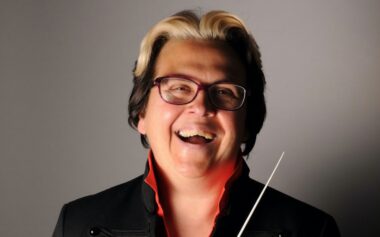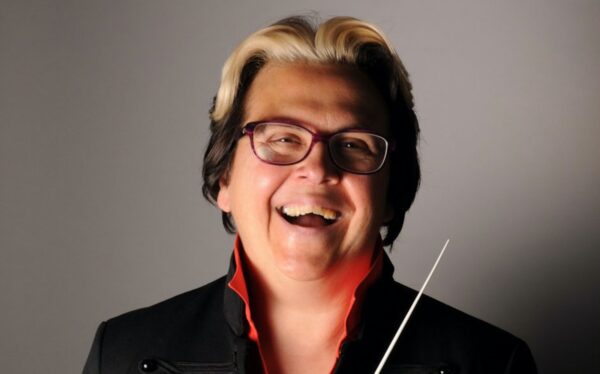 United States Festival of American Music in London – A. Sierra, Lerdahl, Asia, Nichols, Karchin: Lontana / Odaline de la Martínez (conductor). The Warehouse, Waterloo, London, 14.11.2024. (CC)
United States Festival of American Music in London – A. Sierra, Lerdahl, Asia, Nichols, Karchin: Lontana / Odaline de la Martínez (conductor). The Warehouse, Waterloo, London, 14.11.2024. (CC)

Arlene Sierra – Butterflies Remember a Mountain (piano trio)
Fred Lerdahl – Give and Take (violin and cello)
Charles Schadle – Limestone Gap
Daniel Asia – Sonata (violin and piano, UK premiere)
Joshua Nichols – Adagio (clarinet, cello & piano, UK premiere)
Louis Karchin – Incantations and Dances (new version, world premiere)
The London Festival of American Music is a vital annual event that reminds us of and introduces London audiences to voices from across the Pond. This particular concert was entitled ‘Other Important Voices’, and offered a fascinating collection of six composers, birthing two UK premieres and one world premiere in the process. The small audience included several of the composers; and how great to have a reminder of the wonderful, modern space that is The Warehouse in Waterloo.
I first came across the music of Arlene Sierra (two ‘r’s; the programme couldn’t make its mind up) via her contribution to Cuatro Corridos released on the Bridge label. Sierra’s composed the work’s second part: the piece is four views on one story about the profession that is even older than composition. That piece also featured ‘panels’ by Herbert Vásquez, Lei Liang, and Hilda Paredes. Soprano Susan Narucki is the visceral interpreter on that occasion, and Sierra’s music is markedly raw, while managing to remain vibrant.
Sierra’s Butterflies Remember a Mountain was her second piece for piano trio (and appears on another Bridge recording, volume 3 of her music). The title is a composite of the three movement titles: ‘Butterflies’ flits as it well might with this inspiration, strings flighty against piano chorales. The combination of Dominic Saunders (piano), Caroline Balding (violin) and Claire O’Connell (cello) was a powerful one. Lasting around four minutes, the central ‘Remember’ was given a phenomenal technical performance, a masterclass in control by both Balding and O’Connell. But musically, it seemed to lose its way somewhat on this occasion; the performance by its dedicatees, violinist Nicola Benedetti, cellist Leonard Eischenbroich, and pianist Alexei Grynyuk, on the Bridge recording is tauter and more convincing. But The Warehouse performance of the ’A Mountain’ finale was a clear triumph. Sierra’s penchant for working with fragments is a real strength: Lontano’s performance offered a fascinating slant, emphasising the repetitions in a way the Bridge recording does not, allowing for huge cumulative power. And how interesting that such levels of repetitions emphatically did not evoke Minimalism, a real tribute to Sierra’s individual compositional character.
It was good timing here for this performance of Fred Lerdahl’s Give & Take, which arrives around the same time as a release of that piece on the Albany label: Curtis Macomber and Norman Fisher perform there, alongside music for violin and cello by Bolcom, Rochberg, Druckman and Carter, The more music-theoretically inclined readers may recognise Lerdahl’s name from the influential book, co-written with linguist Ray Jackendoff, A Generative Theory of Tonal Music, offering a fascinating adjunct, or even alternative, to Schenkerian analysis. But he is a composer also, and Bridge Records once more has been instrumental in the dissemination of his music.
Written in 2014 for the Musica Nova Helsinki Festival (2015), Give & Take is dedicated to the festival’s artistic director, cellist Anssi Karttunen. Frankly, the composer’s own programme note (reproduced both in The Warehouse programme and in the booklet to the Macomber/Fisher Albany disc) does the work a disservice. It helpfully points out the form of the work (three cycles, the second and third of which expand on the first) but otherwise speaks in generalities. The piece itself is full of sleights of hand, of moments of sudden unanimity that act as much as launching points as arrivals. Lerdahl’s imagination is vast, and yet he reins it in to create a taut, cogent piece, timbrally diverse, punctuated by spike staccatos. The blanched tone found by cellist O’Donnell of Lontano was perfect; Balding’s violin contribution was virtuoso and yet impeccably sensitive. The members of Lontano seem to present the very heartbeat of what chamber music is, lavishing that love on the music of our time. Not a note of Lerdahl’s score is wasted, either. It encompasses, in a duration of about 15 minutes, whole worlds.
The name of Charles Schadle is new to me: he is a Senior Lecturer at MIT in composition, music theory, and music history. He is deeply immersed in native Choctaw music (he is himself a member of the Choctaw Nation of Oklahoma). Written for small ensemble (violin, cello, clarinet, flute and piano), his Limestone Cap was conducted by Odaline de la Martínez, expertly. The music is finely crafted and carefully scored, but most notably it is American music without sounding a jot like Copland; there is a real individuality at work here, coupled with a fierce belief in his subject matter. Some melodies are highly beautiful. I just wonder if structurally the piece is entirely consistent: one arrival point sounded unconvincing.
After the interval, the UK premiere of a relatively early work by Daniel Asia, his Violin Sonata. Asia’s music has deeply impressed me since I heard his string quartets (recorded on Summit records) and, indeed, interviewed him around a record made by Lontano and Odaline de la Martínez of another Summit disc, To Open in Praise.
The Violin Sonata is structured in an arch form of five movements around a central point of meditation that features a ground bass. The first and last movements are both in five sections, while the second and fourth are slighter: ‘episodic, quizzical little teasers,’ as Asia calls them. It is ingenious, but it is also a piece that includes everything from lightness (the opening of the first movement) to that depth of its exploratory centre. The harmonic sophistication of the contrasting area of the first section is lovely, and was brilliantly, warmly highlighted by Balding and Saunders. Quiet playfulness returns for the second movement.
There is a real sense of harmonic ‘knowing’ about that central hub. Both players were on top form: there is a remarkable moment when a long mid-range melody, inspired, is presented by violin; the piano is higher, encrusting the line with diamonds. All credit to Balding’s bow control; the success of this extended passage depends on it. An angular scherzo, violin and piano in alternation, is elusive; the finale seems to return to the sprightliness of the sonata opening, but interiorises via some remarkable stopping passages for violin, at times almost slithering around. It is fascinating music, unpredictable on the surface and yet born of careful organisation. The highlight of the concert.
I have previously enjoyed a disc of Joshua Nichols’s piano music (performed by Jenny Lee, Freya Lin, and Daniel Linder on the Summit label). Writing for the American magazine Fanfare, I said ‘This music has grit and is serious, yet is well variegated and harmonically consistent’. His Adagio for clarinet, cello and piano was written for the Bowery Trio (who have recorded it). It opens with a clarinet question, posed here by William White who is one of the finest clarinetists I have heard: his phrasing is impeccable, his tone lovely). One aspect of the Lontano performance was notable: the care lavished on simple yet vital aspects like hairpins. It elevated the performance to the special; there was gentleness and care everywhere. And Nichols’s score is itself gentle and so well-honed, able to look tonality square in the eyes without being defined by it. Superb.
I remember being very, very impressed by a disc of Louis Karchin’s music on the New Focus label. Karchin was taught by Lerdahl; but also by Bruno Maderna and Gunther Schuller. Originally written for the Da Capo Chamber Players and premiered by them in October 2023, Lontano presented the world premiere of a new version of Karchin’s Incantations and Dances arranged especially for that ensemble which omits the percussion of the original. Two ‘Incantations” are followed by a sequence of dances punctuated by a third Incantation. Minuet meets hoedown meets pavane here. Scored for violin, cello, flute, clarinet, and piano, Karchin’s piece benefitted hugely from Lontano’s clean rhythmic pointing and ultra-tight ensemble. There are moments of real warmth here alongside the grit. The composer’s imagination is vivid (as another example, try his Chamber Symphony in the Bridge recording by The Washington Square Ensemble).
I only wish I could have attended all the other concerts in this, the ninth London Festival of American Music. May there be many more.
Colin Clarke
